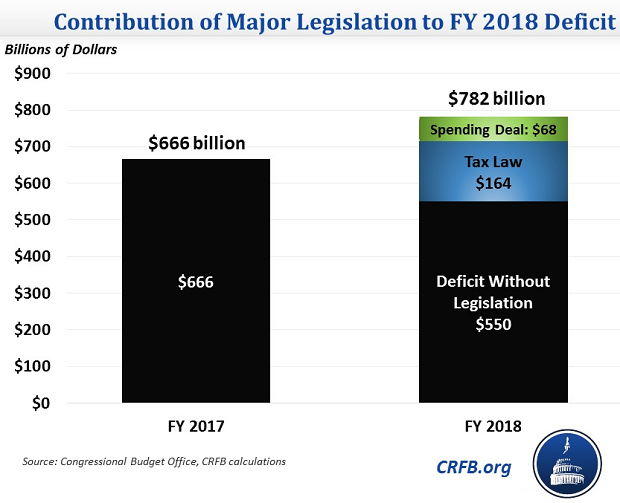You might have missed this with everything else going on in the world, but the Congressional Budget Office said Friday that the deficit for fiscal year 2018 rose to $782 billion, a big jump from the $666 billion shortfall recorded in 2017.
Revenues for the fiscal year, which ended on September 30, were up less than 1 percent on a year-over-year basis, CBO said, while spending was about 3 percent higher. The deficit rose to 3.9 percent of gross domestic product, up from 3.5 percent in 2017.
Where’s the revenue? Heather Long of The Washington Post said a bigger deficit “isn’t supposed to happen” with GDP growing as rapidly as it is. A booming economy that’s adding millions of new jobs should produce higher tax revenues and shrink the deficit, if not eliminate it entirely. Long pointed out that the last time unemployment rates were down near current levels, in 2000 and in 1969, the federal government produced budget surpluses.
The Wall Street Journal’s Nick Timiraos summed up the 2018 shortfall in a tweet: “Federal revenues aren't keeping up with economic output. Receipts rose 0.4% in fiscal 2018, compared to 5.4% nominal GDP growth in Q2.”
The big drop: CBO said that individual tax receipts rose 4 percent in 2018, driven in large part by higher-than-expected payments received in April for the 2017 tax year. Corporate taxes, however, fell by 31 percent, with half of that drop occurring after June as the full effects of the corporate tax cuts kicked in.
Taxes vs. spending: Budget expert Stan Collender revisited the perpetual debate on the fiscal effects of spending compared to taxes, writing that, “It would be easy — but very very wrong — to conclude that the increased spending was the reason the budget deficit rose from 2017 to 2018. After all, revenues were about the same both years while spending was higher.”
But if you compare the actual 2018 numbers to the CBO’s projections for what would have happened if the GOP tax cuts had not been enacted, it becomes clear, Collender says, that “the real reason the budget deficit grew from 2017 to 2018 was because revenues were substantially less than what they would have been without the tax bill. Had it not been enacted, the deficit would have dropped below $600 billion instead of rising to close to $800 billion.”
What comes next: The deficit is expected to keep rising, hitting nearly $1 trillion in the current fiscal year and rising above that level starting in 2020.





